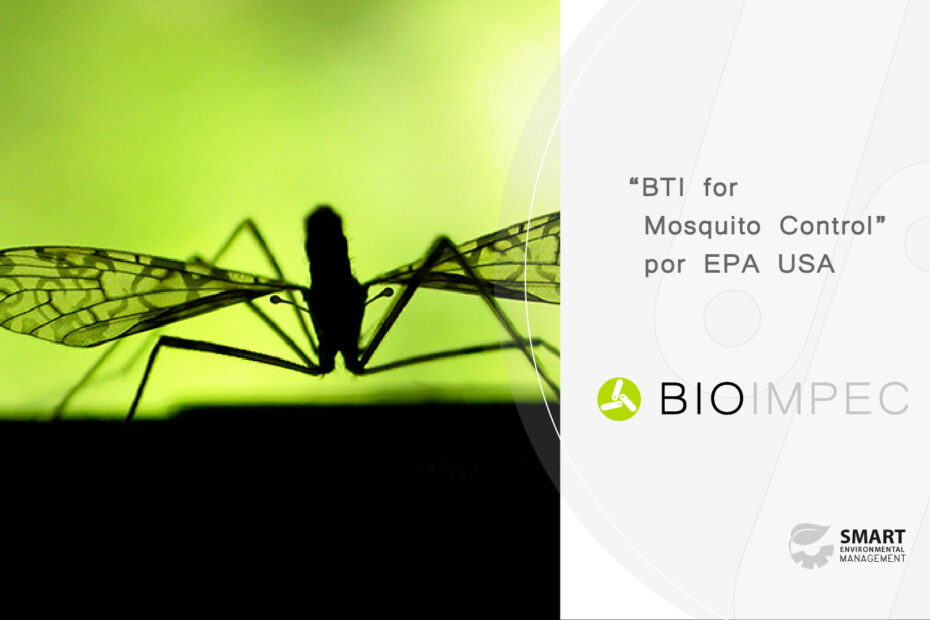We share with our partners and clients the article on the use of BTI for Mosquito Control, published by the United States Environmental Protection Agency (EPA).
https://espanol.epa.gov/control-de-plagas/bti-para-el-control-del-mosquito
1. What is the Bti?
The Bti, whose scientific name isBacillus thuringiensis subspecies israelensis, It is a naturally occurring bacterium found in soils that contains spores that produce toxins that specifically attack and only affect mosquito, black fly and fungal gnat larvae. The EPA registered five different strains of Bti that are found in 48 pesticide products currently approved for use in residential, commercial and agricultural settings, primarily for the control of mosquito larvae.
2. Does Bti pose a risk to human health?
No. The Bti does not present toxicity for the people and its use is approved for the control of plagues in works of ecological agriculture. It was extensively analyzed by many studies on acute toxicity and pathogenicity (ability to cause disease) of the Bacillus thuringiensis, including studies specifically on Bti. Based on these studies, the EPA concluded that Bti does not pose a risk to humans.
3. Where has Bti been used for mosquito control?
Bti is used around the United States for mosquito control. Bti is designed to kill developing mosquito larvae as it is applied in standing water where the larvae are found. Bti can be used around homes, in areas and containers where water can collect, such as flower pots, tires, and birdbaths. Bti can also be used to treat larger bodies of water, such as ponds, lakes, and irrigation canals.
4. Is Bti effective in controlling mosquito larvae?
Yes, Bti was shown to be effective in reducing mosquito larval populations and could be effective in controlling mosquitoes carrying Zika, dengue, and chikungunya in places like Puerto Rico and other areas where these diseases have been identified.
5. Are insects becoming resistant to Bti?
No. There have been no cases of resistance to Bti when used as a larvicide. A recent study confirmed previous research showing a lack of resistance to Bti in mosquito populations that had been treated with Bti for decades.
6. Should special precautions be taken during a Bti fumigation?
No special precautions are necessary when applying Bti. Different Bti products are sold as household products and are easy and safe to use. It is not necessary for people to leave the areas being treated. However, as is the case with many microbial pesticides, for some commercial use Bti products it may be necessary for the person applying it to wear a dust / vapor filter mask.
7. How will I know if aerial spraying will take place?
Decisions about where and when the fumigation will take place will be communicated by local authorities.
Pay attention to announcements in your community with the dates, times, and locations of upcoming spraying on social media sites, newspapers, and radio.
8. Does Bti pose a risk to crops or water supply?
No. Bti is not toxic to humans, so it can be safely applied to mosquito habitat without detrimental impact on food crops or water supplies. In fact, Bti can be used for pest control in organic farming operations.
9. Is Bti harmful to wildlife, including honey bees?
Studies indicate that Bti has minimal toxicity to honey bees. Bti produces toxins that specifically affect mosquito, black fly, and fungal gnat larvae only. These toxins do not affect other types of insects, including honey bees.
10. Is there a medical test that proves that I was exposed to Bti?
Since Bti is not toxic to humans, a medical test has not been developed to demonstrate exposure to the active ingredient.
11. In addition to aerial spraying, what other measures should be taken to control the mosquito?
- Eliminate standing water (even small amounts) to prevent infected mosquitoes from laying their eggs (spawning) there.
- Place screens on doors and windows to prevent infected mosquitoes from entering homes, workplaces, or schools.
- Use EPA-registered insect repellants to avoid bites. "EPA Registered" means that the product works and is safe when instructions are followed.
- Wear light-colored clothing, long pants, and long-sleeved shirts, and try to avoid areas where there are mosquitoes.
